With a solemn ceremony at the Forschungszentrum Jülich, Germany introduced JUPITER, the first European supercomputer capable of surpassing the exa-scale barrier (1 quintillion operations per second). The inauguration was attended by Federal Chancellor Friedrich Merz, Prime Minister of North Rhine-Westphalia Hendrik Wüst, and distinguished figures from the scientific and industrial sectors.
The commissioning of JUPITER marks a historic milestone for high-performance computing (HPC) in Europe, establishing Germany as a global technological leader.
An exascale powerhouse at the service of science
Developed by the Jülich Supercomputing Centre (JSC) in collaboration with the EuroHPC Joint Undertaking, JUPITER can perform more than 1 ExaFLOP/s in scientific calculations and up to 40 ExaFLOP/s in AI applications, making it the fastest supercomputer in Europe and the fourth in the world.
At its core is the JUPITER Booster, equipped with about 24,000 superchips NVIDIA GH200 Grace Hopper and connected with Quantum-2 InfiniBand technology. This hybrid architecture merges AI and high-performance computing, enabling everything from training large-scale AI models to climate, energy, medical, and new materials simulations with unprecedented levels of detail.
Inauguration voices
During the event, leading political and scientific figures emphasized the strategic importance of the project:
- Friedrich Merz, German Chancellor: “JUPITER demonstrates that Germany can set new standards in the development and application of future technologies. Our security and competitiveness depend on technological sovereignty.”
- Hendrik Wüst, Prime Minister of North Rhine-Westphalia: “This supercomputer symbolizes the structural shift in the Rhine mining basin: from the coal era to the AI era. Additionally, it is the most energy-efficient in its category worldwide.”
- Henna Virkkunen, Executive Vice President of the European Commission for Digital Sovereignty: “JUPITER proves that European cooperation can achieve global excellence. It’s a pioneer of European digital sovereignty.”
- Jensen Huang, CEO of NVIDIA: “JUPITER combines HPC and AI on a single platform and will accelerate discoveries across all domains, from renewable energy to quantum research.”
Science, industry, and digital sovereignty
The supercomputer will drive more than 100 ongoing international projects, including:
- Predicting extreme weather events, such as torrential rains or heatwaves.
- Researching advanced medical therapies through protein and cell simulations.
- Designing sustainable energy systems and supporting the ecological transition.
- Developing innovative materials for the technology and transportation industries.
Furthermore, it will serve as the core of the JUPITER AI Factory (JAIF), an open platform for startups, SMEs, and industry that will enable large-scale trained AI models to be used in real-world applications.
Record-breaking construction and energy efficiency
One of the most remarkable aspects is that JUPITER was completed in less than two years (construction began in December 2023) and is housed in a modular data center specifically designed for it.
Its infrastructure prioritizes energy efficiency:
- It is the most energy-efficient exascale supercomputer in the world, according to the TOP500 list.
- Employs a hot water cooling system, capable of reusing the generated heat for heating buildings on the Jülich campus.
- Runs on renewable electricity, minimizing its carbon footprint.
In a context where the International Energy Agency warns that data center electricity consumption could double before 2030, JUPITER offers a model of sustainable computing.
Investment and funding
The JUPITER project, acronym for “Joint Undertaking Pioneer for Innovative and Transformative Exascale Research”, required an investment of 500 million euros, financed as follows:
- 50% by the EuroHPC Joint Undertaking.
- 25% by the German Federal Ministry of Research, Technology, and Space (BMFTR).
- 25% by the Ministry of Culture and Science of North Rhine-Westphalia, through the Gauss Centre for Supercomputing.
Conclusion
With JUPITER, Europe fully enters the exa-scale era, a domain previously dominated by the United States and Asia. Germany and the European Union reinforce their commitment to digital sovereignty, cutting-edge scientific research, and responsible AI development.
Beyond the ExaFLOPs figure, this supercomputer symbolizes a new chapter: a continent seeking to lead the future of technology through innovation, cooperation, and sustainability.
Frequently Asked Questions (FAQ)
What is an exascale supercomputer?
It is a system capable of performing at least 1 quintillion operations per second (1 ExaFLOP/s), exponentially increasing computational capacity compared to previous generations.
In what fields will JUPITER be used?
It will be applied in climate, energy, biomedicine, advanced materials, AI, and quantum computing.
Why is it considered so energy-efficient?
Because of its combination of renewable energy sources, reusable hot water cooling, and an optimized hardware and software design.
What does having JUPITER mean for Europe?
It signifies a key step toward European digital sovereignty, reduces technological dependence on the U.S. and Asia, and attracts scientific and industrial talent to the continent.

